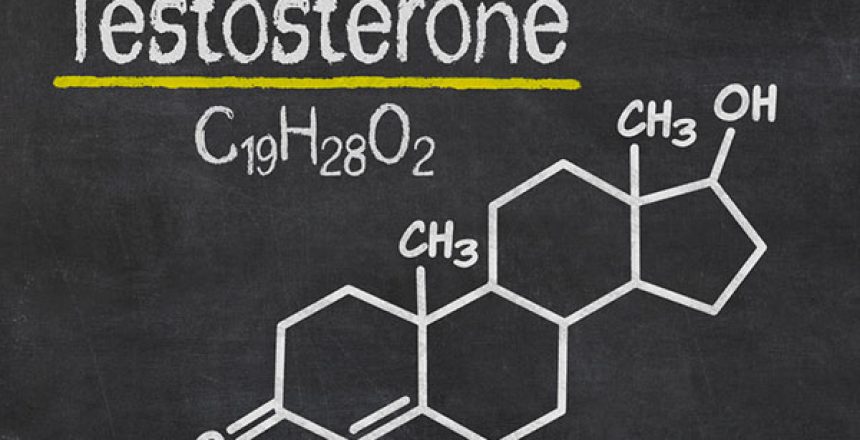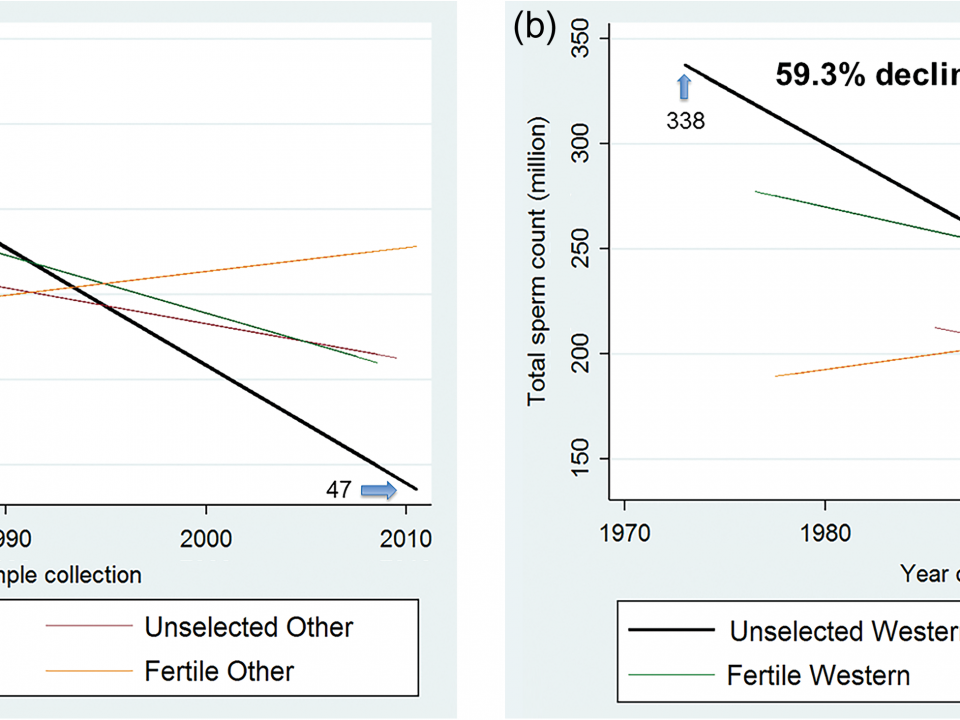Many men are marginally zinc deficient, and supplementing with zinc raises testosterone and improves sexual health in parameters such as semen volume. Following are several studies that show the dramatic effects of zinc supplementation. (Note that if you have no zinc deficiency, then taking more zinc will not raise testosterone more.)
Identification of the andrological variables most sensitive to zinc depletion would expedite the diagnosis of male reproductive pathology induced by zinc deficiency. Eleven volunteers living on a metabolic ward were fed a diet composed of a mixture of a semisynthetic formula and conventional foods supplemented with ZnSO4 to supply a total of 1.4, 2.5, 3.4, 4.4, or 10.4 mg Zn/d. After an equilibration period of 28 d (10.4 mg Zn/d), all treatments were presented for 35 d each, the first four in random order and the fifth last. Compared with when they were consuming 10.4 mg Zn/d, volunteers consuming 1.4 mg Zn/d exhibited decreased semen volumes (3.30 vs 2.24 mL) and serum testosterone concentrations (26.9 vs 21.9 nmol/L), and no change in seminal zinc concentrations. Compared with 10.4 mg Zn/d, treatments of 1.4, 2.5, and 3.4 mg Zn/d decreased the total semen zinc loss per ejaculate (6.29 vs 3.81, 4.68, and 5.03 mumols/ejaculate). Seminal loss accounted for 9% of total body zinc loss when 1.4 mg Zn/d was consumed. Seminal phosphorus concentrations were elevated during all four phases of zinc depletion (28.4 vs 32.9, 31.0, 34.2, and 33.6 mmol/L). The findings suggest that serum testosterone concentrations, seminal volume, and total seminal zinc loss per ejaculate are sensitive to short-term zinc depletion in young men.
Effect of Oral Zinc Therapy on Gonadal Function in Hemodialysis Patients: A Double-Blind Study
Zinc deficiency may account for the persistence of gonadal dysfunction in a majority of uremic men despite adequate dialysis. Twenty stable patients having hemodialysis three times a week completed a double-blind trial using either 50 mg of elemental zinc as zinc acetate (10 patients) or placebo (10 patients), orally. At the end of the 6-month study period, a significant increase in the mean (± SE) plasma zinc (75 ± 2 µg/dL to 100 ± 2 µg/dL, p < 0.001), serum testosterone (2.8 ± 0.3 ng/dL to 5.2 ± 0.5 ng/mL, p < 0.001), and sperm count (30 ± 3 million/mL to 63 ± 5 million/mL, p < 0.001) occurred in the zinc-treated group, but not in those receiving the placebo. The zinc-treated group also had a significant fall in serum luteinizing hormone (92 ± 10 mIU/mL to 49 ± 26 mIU/mL, p < 0.005) and follicle stimulating hormone (45 ± 9 mIU/mL to 25 ± 7 mIU/mL, p < 0.05), not seen in the placebo group. Patients receiving zinc had an improvement in potency, libido, and frequency of intercourse not found in the placebo group. These results suggest that zinc deficiency is a reversible cause of gonadal dysfunction in patients having regular hemodialysis
Zinc status and serum testosterone levels of healthy adults.
Zinc deficiency is prevalent throughout the world, including the USA. Severe and moderate deficiency of zinc is associated with hypogonadism in men. However, the effect of marginal zinc deficiency on serum testosterone concentration is not known. We studied the relationship between cellular zinc concentrations and serum testosterone cross-sectionally in 40 normal men, 20 to 80 y of age. In four normal young men (27.5 +/- 0.5 y), we measured serum testosterone before and during marginal zinc deficiency induced by restricting dietary zinc intake. We also measured serum testosterone in nine elderly men (64 +/- 9 y) who were marginally zinc deficient before and after 3 to 6 mo of supplementation with 459 mumol/ d oral zinc administered as zinc gluconate. Serum testosterone concentrations were significantly correlated with cellular zinc concentrations in the cross-sectional study (lymphocyte zinc versus serum testosterone, r = 0.43, p = 0.006; granulocyte zinc versus serum testosterone, r = 0.30, p = 0.03). Dietary zinc restriction in normal young men was associated with a significant decrease in serum testosterone concentrations after 20 weeks of zinc restriction (baseline versus post-zinc restriction mean +/- SD, 39.9 +/- 7.1 versus 10.6 +/- 3.6 nmol/L, respectively; p = 0.005). Zinc supplementation of marginally zinc-deficient normal elderly men for six months resulted in an increase in serum testosterone from 8.3 +/- 6.3 to 16.0 +/- 4.4 nmol/L (p = 0.02). We conclude that zinc may play an important role in modulating serum testosterone levels in normal men.
The testosterone level in healthy elderly men doubled over the course of 6 months with zinc supplementation. This may be the explanation for lower T levels in elderly men.
Got zinc?










12 Comments
How much to dose? I’ve been taking for a while, though a very low dose (whatever is in a multivitamin).
In the 2nd study above, dose was 50 mg/d, and in the 3rd, about 30 mg/d (459 micromoles, which is 30 mg by my calculation). Both of these doses appear to be high for long term use unless in the face of a real zinc deficiency. I believe 30 mg is the highest recommended dose, but I would take less personally if taking daily.
Plasma zinc appears to be a poor indicator of zinc status since it varies little. In the 3rd study, the authors used white cell zinc levels to determine deficiency.
Anonymous#1 You can get various “ZMA” supplements from Amazon. A blend of B-6, magnesium and zinc. ZMA is billed as a testosterone booster, but “all” it really does is fix the common zinc and magnesium deficiencies. I take it 5 or so times a month, along with nightly magnesium citrate+potassium.
Second study:
“Twenty stable patients having hemodialysis three times a week completed a double-blind trial using either 50 mg of elemental zinc as zinc acetate (10 patients) or placebo (10 patients), orally.”
It appears 30mg 3 times/wk.
Derp. 50mg 3 times/wk.
Zinc is a trace element that plays an important role in sexual and reproductive functions. Dietary sources of zinc include oysters, clams, baked beans, sesame and watermelon seeds, and beef liver. If you aren’t getting enough zinc from your diet, look up Ageless Male supplement reviews. This supplement contains zinc along with other important ingredients that improve testosterone levels and restore strength and vitality. https://vimeo.com/56911861
” Seminal loss accounted for 9% of total body zinc loss when 1.4 mg Zn/d was consumed.”
Anyone know if a vasectomy reduces seminal zinc loss? Ie. is the zinc in the sperm or the seminal fluid?
It is my understanding that taking zinc without a much larger amount of magnesium will cause magnesium deficiency. Something like 75% of people are already magnesium deficient. Magnesium deficiency is probably a more serious and common issue than zinc.
I consider zinc the master mineral for men. It can have dramatic effects (if deficient) when taken. Low zinc status makes absorption of zinc more difficult, which can make it difficult to restore normal levels. Over the years I’ve come to regard zinc citrate as the most effective form to use. If you’re deficient and successfully restore your zinc levels, you can expect impressive improvements to: your eyesight, sense of smell, hair quality, skin quality, stamina, mood, digestion and libido. Nothing produces more dramatic effects (in deficient men). This is from personal experience.
Thanks, TM. Seems that zinc may be like magnesium in the sense that a lot of people are deficient in it. There are reports that suggest that in older people, zinc can regrow the thymus gland, the zinc transporter that absorbs zinc being one of the first things to deteriorate in aging.
Here again, as with magnesium, it looks like I’ve been taking the worst sort for several months: zinc oxide. I shall switch to citrate or gluconate forthwith.